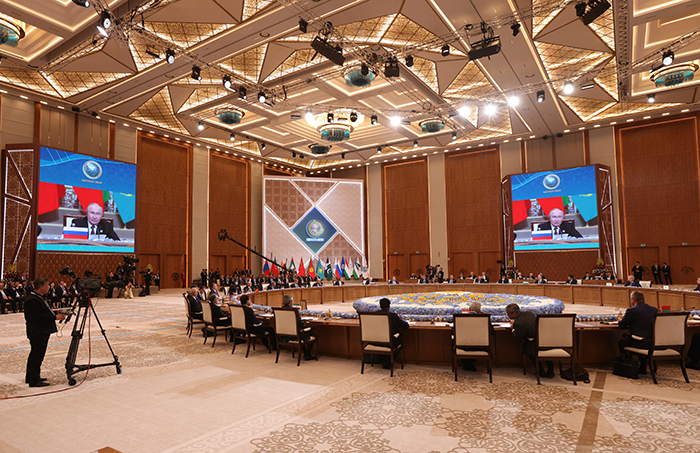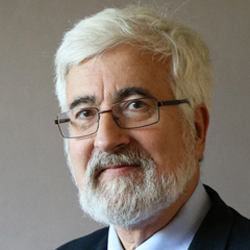Interviews
9 July 2024
Shanghai Cooperation Organisation Summit: Affirmation of a Multipolar World Order ?

Last week, the Shanghai Cooperation Organisation (SCO) held its annual summit in Astana. Alongside the admission of Belarus, the political agenda was particularly full, ranging from cooperation on crime and terrorism to the war in Ukraine, and the proposed reconciliation between Turkey and Syria. Positioned in opposition to Western hegemony on the international stage, the SCO embodies a vision of a multipolar world — reflected in the presence of Iran, India, and Pakistan alongside Russia and China, as well as 14 partner states. What are the strategic objectives of this institution? How do Russian and Chinese interests coexist across Eurasia? What does Belarus’s entry into the SCO signify? Insights from Jean de Gliniasty, Director of Research at IRIS, former French Ambassador to Russia, and specialist in Russian affairs.
The latest summit of the Shanghai Cooperation Organisation (SCO) took place on 3–4 July in Astana, Kazakhstan. What were the priorities on the agenda? To what extent does this summit — and the organisation itself — carry strategic importance ?
The Astana Summit marks a further step in the expansion of the SCO’s agenda. Originally founded in 2001 by China and Russia, the Organisation was primarily focused on stabilising Central Asia and its newly independent states (excluding neutral Turkmenistan), around a few key priorities: terrorism, ethnic separatism, religious extremism — later joined by issues such as drug trafficking, cross-border crime, and even illegal immigration. Gradually, the SCO became a legitimising framework for China’s Belt and Road Initiative. The admission of India and Pakistan in 2021, followed by Iran in 2023, extended its regional scope. The war in Ukraine intensified the SCO’s critique of the West and its call for a multipolar world (the SCO rejected a U.S. application to join). The Astana summit represents another step in the transformation of the SCO into a multilateral organisation addressing major global issues from an anti-Western perspective.
In its final declaration, the SCO of course advocates for a multipolar world, welcomes the “Global Unity Initiative for Fair Peace, Harmony and Development”, inviting the global community to support it, backs the expansion of the UN Security Council to include countries of the Global South, criticises the deployment of anti-missile systems as “threats to international security”, calls for a binding treaty on the demilitarisation of space, denounces Western sanctions, and demands implementation of an action plan regarding Iran’s nuclear programme. Twenty documents were signed covering the SCO’s more traditional areas of activity (terrorism, drugs, crime, environment, organisational development). But, more importantly, on the sidelines of the official meetings, bilateral contacts addressed major global issues: the war in Ukraine, with reminders of Russian proposals and Erdoğan’s peace plan (which the Russians now reject); Turkish-Syrian reconciliation…
In Astana, the SCO clearly appears as an international organisation that, while centred on Eurasia, has a global vocation, remains integrated into the UN system (evidenced by the presence of Secretary-General Guterres), promotes a multipolar vision of the world that is clearly anti-Western, and actively opposes Western “hegemony”.
Belarus, a supporter of Russia in the Russia-Ukraine conflict, became the 10th member to join the Organisation last Thursday. Why has Belarus joined the SCO, and what prospects does this membership offer ? What benefits can Moscow gain from this enlargement — and has it driven the process ?
The entry of Belarus and the formal welcome of President Lukashenko at the summit’s opening underscore the SCO’s anti-Western posture in the context of the war in Ukraine. This is clearly in Russia’s interest, as it expands its influence, but also in Belarus’s, as it gains recognition as an autonomous and fully independent state — despite Moscow’s increasing hold over it. Apart from Russia, China is the only country Lukashenko has visited on a state trip (in March 2023). There is little doubt that he used that occasion to prepare his country’s accession to the SCO. All sides stand to gain from the move: China further extends its influence in Europe, Russia consolidates its support within the Organisation, and Belarus strengthens its hand, even within the narrow scope left to it vis-à-vis Moscow.
Given Beijing’s influence in Central Asia and Ankara’s in the Caucasus and Turkic steppes, how do these powers manage their competing interests in the region? How does Moscow position itself in this regard ?
The multipolar world championed by Russia, Turkey, China, and others does not claim to erase differences of interest between major powers, but rather to limit their destabilising effects, resolve them when possible, and ease tensions while respecting the equality of member states. With now 10 member states and 14 dialogue partners — including Turkey, Egypt, Saudi Arabia, Bahrain, the United Arab Emirates, and Qatar — representing 40% of the world’s population and 30% of its GDP, the SCO aims to act as a stabilising force in managing rivalries between members or dialogue partners. And there are many tensions: Russia–China in Central Asia, Russia–Turkey in the Caucasus, India–Pakistan in Kashmir, Turkey–Iran and Iran–Gulf States in the Middle East…
The SCO has helped establish, especially after the invasion of Iraq and the Syrian crisis, the notion that Western intervention is destabilising — and that a forum from which the West is absent is beneficial to its participants. Yet this idea is not unanimously shared within the Organisation: President Narendra Modi did not attend the Astana summit, and the Central Asian states continue to pursue a multi-vector foreign policy.
In any case, Moscow sees the SCO as a means to highlight the fallacy of its supposed isolation (Vladimir Putin was not arrested in Astana, despite Kazakhstan being a signatory to the Rome Statute and member of the International Criminal Court), to present its case on Ukraine, to keep a watchful eye on Central Asia and the Caucasus despite Chinese or Turkish advances, and to assert — when possible — an anti-Western perspective.

